The Universe: The Complete Season Five Blu-ray Movie
HomeThe Universe: The Complete Season Five Blu-ray Movie 
A&E Home Video | 2009 | 376 min | Not rated | Jan 11, 2011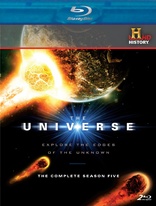
Movie rating
6.9 | / 10 |
Blu-ray rating
| Users | 0.0 | |
| Reviewer | 3.5 | |
| Overall | 3.5 |
Overview
The Universe: The Complete Season Five (2009)
Travel through the galaxies and explore extraterrestrial phenomenon with this sweeping examination of the universe from The History Channel, which uses state-of-the-art computer technology to take viewers up close to distant planets and stars. Topics include black holes, comets, alien galaxies, star deaths, the moon, the interior of the sun and much more. All 13 episodes from the first season are included, plus the bonus episode "Beyond the Big Bang."
Narrator: Erik Thompson| Documentary | Uncertain |
| Nature | Uncertain |
| History | Uncertain |
Specifications
Video
Video codec: MPEG-4 AVC
Video resolution: 1080p
Aspect ratio: 1.78:1
Original aspect ratio: 1.78:1
Audio
English: DTS-HD Master Audio 2.0
Subtitles
English
Discs
50GB Blu-ray Disc
Two-disc set (2 BDs)
Playback
Region A (B, C untested)
Review
Rating summary
| Movie | 3.5 | |
| Video | 4.5 | |
| Audio | 4.5 | |
| Extras | 0.0 | |
| Overall | 3.5 |
The Universe: The Complete Season Five Blu-ray Movie Review
Back to the future.
Reviewed by Jeffrey Kauffman January 22, 2011The Universe has been one of the more consistently interesting series The History Channel has served up over the past several years. While the show has delved into apocalyptic depths a bit too much for its own good, something endemic of History as a whole, it has been a sterling example of how to make science interesting. Filled with excellent CGI, cogent commentary and some fascinating subject matter, The Universe nonetheless seemed more likely to be a short run phenomenon when it first premiered a few years ago. Despite this fifth season’s assertion that we’re only now at the dawn of the most exciting era of space exploration ever (probably true), the fact remains that we really know very little about the infinite reaches beyond our planet, and what we do know was at least adequately covered in The Universe’s opening couple of seasons. And that in fact is one of the major problems with The Universe: The Complete Season Five: you can’t help but think you’ve seen a lot of this information before, and sometimes in greater depth, on previous seasons of the show. The series strives, quite artfully at times, to gussy up the “same old, same old” with shiny new CGI and some putative new angles on whatever they’re discussing, but if you’ve been watching The Universe from day one, you will probably be asking, “Yeah, so what else is new?” If you stick with the series, though, there are some glints of new information, including some relatively recent discoveries, that are tucked away in various nooks and crannies of individual episodes. But like a distant space probe searching the infinite, and largely empty, reaches of deep space, those nuggets are getting harder and harder to find as this series wends on into its fifth year.
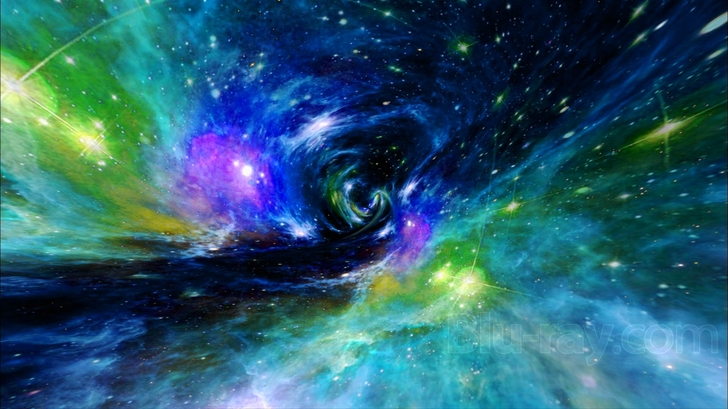
The Universe: The Complete Season Five includes eight episodes spread over two Blu-ray discs:
7 Wonders of Our Solar System. Virtually every “wonder” in this “greatest hits” sort of episode has had either its very own episode on previous seasons of The Universe, or at the very least, a mention or two along the way. Anyone with half a brain is probably going to guess what the primary “wonder” of the universe is, so I won’t explicitly spoil it, other than to say it may reveal a little chauvinism (in the classic sense of the word) on the part of the series’ writers. The other six wonders run the gamut of interesting phenomena like the rings of Saturn, Enceladus, the Great Asteroid Belt and the Surface of the Sun. There’s literally nothing much new here, but there is some very interesting information, including a nice segment on the universe’s largest volcano, Olympus Mons (which in fact gets more coverage in the next episode, Mars: The New Evidence).
Yes, we’ve been to Mars repeatedly in previous Universe seasons, but the fact is Mars: The New Evidence actually does offer some new data, including some as recent as 2010, highlighted by President Obama’s cheerleading speech to NASA that the United States would attempt to orbit and ultimately land on the Red Planet with manned missions. The old bugaboo “life on Mars” gets a somewhat novel workout here as various scientists discuss microbial and bacterial life that has in fact already been discovered there. The raging controversy of what exactly is clinging to the landing legs of the Phoenix probe is also looked at, within the context of previous rushes to judgment about little green men, faces in the dunes and a curious Bigfoot looking creature that turned out to be a two inch high rock.
Magnetic Storm. Aaaaand, we’re off into the apocalypse again. One of the problems of reviewing a series like The Universe, where the entire season is seen often in one sitting, is how attuned one becomes to just how often this show goes to the “end of the world” well. Well, we’re there again, and not for the first time in terms of CME, otherwise known as Coronal Mass Ejections. This humongous “burps” expelled from the sun’s surface emit gigantic waves of electromagnetic energy which are a hundred thousand miles in width. There is some quite new footage from the SDO, i.e, the Solar Dynamics Observatory, a probe launched in February 2010 to monitor the entire surface of the sun. There’s also some interesting, albeit brief, information about previous solar storms which managed to wreak at least a little havoc on our planet, including a 1989 power outage in Quebec, and much worse storm in 1859.
Time Travel is one of the more fun episodes of this season, although it’s also one of the most speculative and hypothetical, for obvious reasons. We get a quick primer in Einstein’s Theory of Relativity and how that pertains to time, and we also get a quick look at how even the last generation of astronauts experienced time shifting on a miniscule scale. The science fiction trope of paradoxes brought about by time travel is also explored, and in fact it’s posited that the universe simply won’t allow travel to past times to “avoid” those very paradoxes. While this may in fact venture more into science fiction than some of the other episodes, it’s interesting and at times even charming as it explores one of the more fascinating ideas that has haunted Mankind for millennia.
Secrets of the Space Probes. That title almost makes it sound like we’re in for a National Enquirer sort of salacious revelatory episode, but this is an interesting, if fairly routine, account of a number of probes that we’ve shot into space over the past fifty or so years. Some of these probes are quite well known, as in the case of the Hubble Telescope, but others, like 2005’s Deep Impact probe, which blasted away part of the Tempel 1 comet, are perhaps less known or at least less remembered. The best part of this episode is the brief overview of the United States’ early efforts to launch probes, including the kind of funny account that our first six Ranger probes, which were designed to crash into the Moon, managed to miss our satellite entirely. Luckily, our aim improved over time.
Asteroid Attack. What time is it? It’s Apocalypse Time! And, like Magnetic Storms, this very subject has been covered previously on The Universe. The lowdown is this: big, bad asteroids are going to smack into the earth and cause devastation on an order not seen since the destruction of the dinosaurs. Or maybe not. This is yet another maddening episode for a couple of reasons. First, we’ve seen it all before, and second, what interesting scientific facts there are here (and there are a lot) are buried under the hyperbole of this endless “end of the world” approach this series takes. In fact the most interesting aspect of this episode has absolutely nothing to do with the supposed asteroid attack. Instead, it’s about how future space travelers may mine asteroids for ice, water, hydrogen and other elements to help sustain them on long journeys and actually provide fuel for those very journeys.
Total Eclipse. Yes, you guessed it, the end of the world is coming, this time in 2012. Various aspects of total eclipses are examined in this episode, including a concatenation of events which of course has received breathless coverage on any number of History Channel shows, notably the “end” of the Mayan calendar in December of next year. We also get to meet some “eclipse chasers,” odd people who fly around the world to be able to see various solar eclipses in different latitudes and continents. There’s a fascinating segment on artificial eclipses “caused” by filtering light caught on space probe cameras, so that coronal emissions can be more properly analyzed.
Dark Fate of the Sun. Well, there’s finally a little truth in advertising on this final episode of the fifth season of The Universe The narrator actually talks about the “apocalypse” in his opening diatribe, and one of the chapter headings on the Blu-ray is entitled “Solar Apocalypse.” So you know what you’re in for going in to this episode. In a mere five billion years or so, the sun is going to go to red giant status, and then to white dwarf. Neither of those bodes very well for Planet Earth. We’ll either be incinerated or freeze to death, sort of like that old Twilight Zone episode with Lois Nettleton. There’s interesting enough information in this episode, but it’s just too much of “been there, seen that,” as the Sun’s future has, like so much else in this season, already been covered in previous episodes.
The Universe: The Complete Season Five Blu-ray Movie, Video Quality 
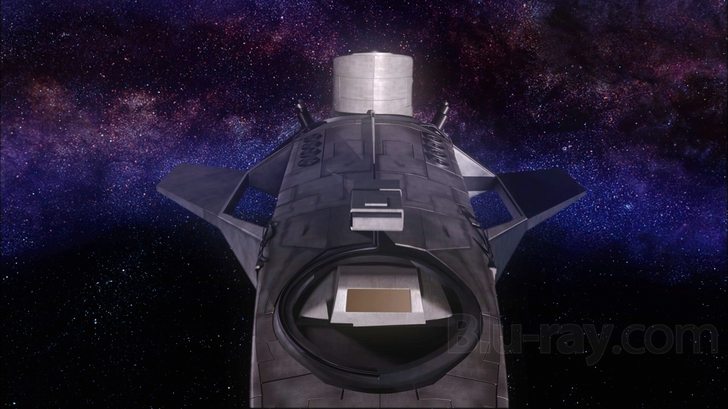
As you might expect from a series that is comprised of so much CGI material, The Universe: The Complete Season Five's AVC encoded 1080p image (in 1.78:1) is sparklingly clear, brilliantly sharp and lushly saturated. The CGI elements throughout much of this season are really spectacular, though there are some hamhanded moments (a spaceman floating in space looks like something out of a 1950's B movie, and the depiction of the demise of the dinosaurs isn't much better). Stars erupt, spacecraft zooms through oily black darkness and any number of obscure scientific theories are illustrated with excellent animation, and it all looks amazing for the most part. There's actually less archival footage in this season than in some previous years of The Universe, and that means moments of blown up 16mm or 35mm grainy footage is at a minimum. Contemporary interview segments all look great, with good color, clarity and sharpness.
The Universe: The Complete Season Five Blu-ray Movie, Audio Quality 
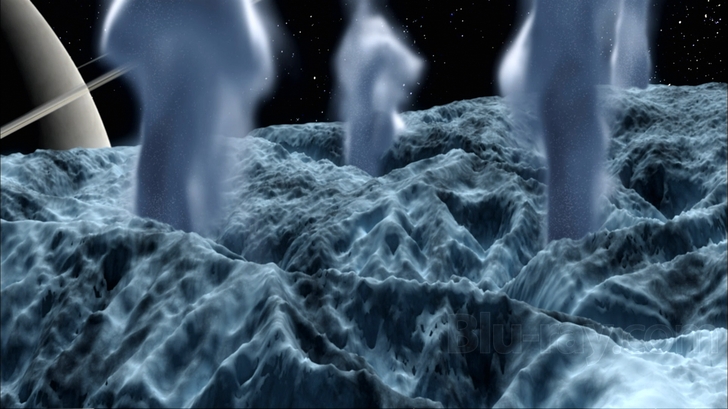
The Universe: The Complete Season Five gets a lossless DTS-HD Master Audio 2.0 mix for its soundtrack, and though a surround mix probably would have been quite effective for this effects laden series, what's here is robust, sports excellent fidelity and best of all isn't completely overrun with nonstop LFE. That said, this is a relentlessly busy track, with almost omnipresent sound effects. Whooshes, zings, crashes and smashes all populate each episode and it can get a bit tiring if you watch a bunch of these one after the other. There's really great shuddering lows throughout many episodes of this season, and in fact all of the sound effects are imaginatively handles, providing a wealth of sonic variety. Narration and onscreen interviews are all extremely clear.
The Universe: The Complete Season Five Blu-ray Movie, Special Features and Extras 
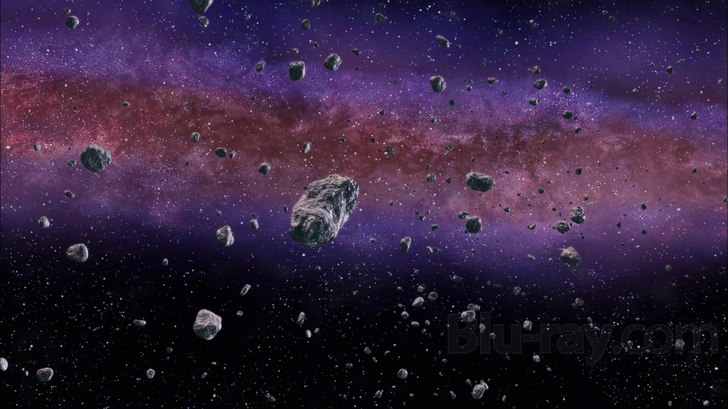
No supplements are offered on either Blu-ray disc included in this set.
The Universe: The Complete Season Five Blu-ray Movie, Overall Score and Recommendation 
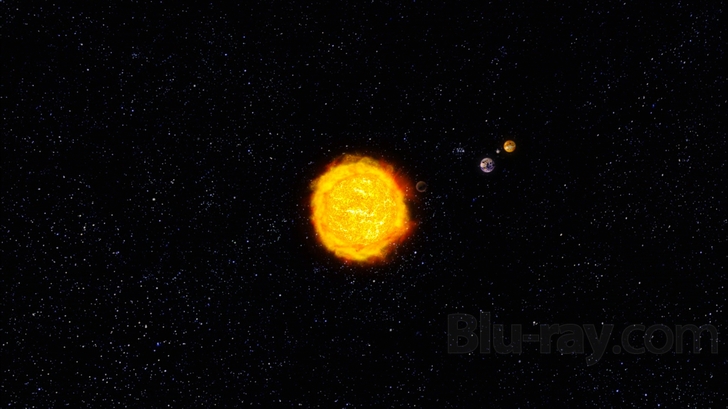
The law of diminishing returns may finally be catching up with The Universe as it enters its fifth season. Too much of this material has already been covered, and way too much of it is apocalyptic in nature. Still, there's a lot of interesting information here. My advice to History Channel is to make this show a recurring series of specials, rather than a weekly episodic affair (however few weeks are included in any given season). That might return some of the fun and newness to this enterprise, which is seeming a bit tired and long in tooth. Still, there's enough here for the armchair astronomer to make this season Recommended.
Other editions
The Universe: Other Seasons

The Universe: The Complete Season One
2007

The Universe: The Complete Season Two
2008

The Universe: The Complete Season Three
2008

The Universe: The Complete Season Four
2009

The Universe: 7 Wonders of the Solar System 3D
2010

The Universe: The Complete Season Six
2011

The Universe in 3D
2011

The Universe: The Complete Season Seven
Ancient Mysteries Solved
2013
Similar titles
Similar titles you might also like

Wild Ocean
IMAX
2008

Dinosaurs Alive!
IMAX
2007

Journey to the Edge of the Universe
2009

IMAX: Hubble 3D
2010

Grand Canyon Adventure: River at Risk 3D
IMAX 3D
2008

Mummies: Secret of the Pharaohs
IMAX
2007

Ocean Wonderland 3D
2003

History of the World in Two Hours 3D
2011

Space Station 3D
IMAX
2002

Deep Sea 3D
IMAX
2006

When We Left Earth: The NASA Missions
2007

Under the Sea
IMAX
2009

3D Safari: Africa
2011

Sharks 3D
2004

Galápagos
2006

The Ultimate Wave: Tahiti 3D
IMAX
2010

Wonders of the Solar System
2010

WWII in 3D
2011

The Universe in 3D: A Whole New Dimension
2013

Legends of Flight 3D
IMAX
2010